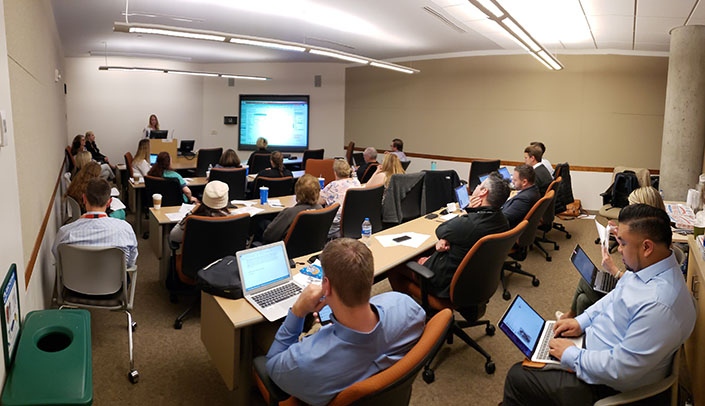It’s served the medical center well for some 25 years, but it’s time to retire the clinical platform known as “OTTR (Organ Transplant Tracking Record).” It’s been in use since the 1990s to track transplant patients. On Saturday, Dec. 7, OTTR will be replaced by the Epic transplant module Phoenix.
The new Phoenix platform will allow for greater efficiency, as the transplant team will no longer have to document in two places, and it will improve patient safety, as the entire patient record will be in the same chart.
“Our transplant teams are really excited about having one electronic medical record to work in daily,” said Deborah Andersen, manager, Nebraska Medicine Liver and Intestinal Transplant Program. “Phoenix will allow our teams to keep the same work functions with our patients while providing other consulting and multi-disciplinary teams access to patient information that was previously only held in our own electronic medical record.”
It’s taken a lot of work to get to this point. Over the past year and a half, transplant team members have worked with the Phoenix project team to ensure the unique intricacies of the transplant patient record are accounted.
“I could not be more proud of our transplant programs for really leaning into this work,” Andersen said. “It was really hard work. The transplant teams were engaged in their learning and attended many hours of training workshops as well as final training in the last month. I also want to recognize the really great work of the One Chart and Phoenix teams. They were incredibly patient and present through all the work.”
Transplant information systems have a rich history at UNMC and Nebraska Medicine. In fact, OTTR was originally developed by a team of physicians and software developers at UNMC in the 1990s. OTTR became its own company and was sold all over the world.
“The Epic Phoenix module has advanced over the years to meet the needs of the complex transplant patient and aligns with our strategy to create a seamless electronic health record,” said David Cloyed, applications manager for the One Chart team.
Epic’s Phoenix module allows for clinicians to review patient information across the care continuum without needing to switch from one application to another. Phoenix is used by more than 100 transplant centers, and it’s estimated that approximately 50% of all transplants in the U.S. were documented in the Phoenix module this past year.
The transplant programs will benefit from One Chart’s robust patient tracking tools, improved reporting capabilities, outside information integration through Care Everywhere and the ability to transmit and receive information to and from UNOS on a weekly basis.
“None of this would have been possible without the dedication and commitment the Transplant Program’s staff have put forth over the past year,” Cloyed said. “Each of the program managers — Vicki Hunter, Deb Andersen, Bobbi Heffelfinger, and Morgan Moody — have demonstrated their commitment to excellence for their patients and their staff throughout the project.”
More than 200 users have been trained on Phoenix to date. OTTR6, the current version of OTTR the transplant team uses, will be set to “read-only” the afternoon of Friday, Dec. 6. A good portion of the transplant record in OTTR will be converted into One Chart. (OTTR5, the platform used by bariatrics and orthopaedics, is not impacted at this time.)
The Phoenix project team will operate a command center during business hours and provide at-the-elbow support from Monday, Dec. 9 to Friday, Dec. 20. After hours support will be routed through the Nebraska Medicine Service Desk. Questions regarding the Phoenix implementation and other One Chart needs may be sent to OneChartTrainingRequests@nebraskamed.com.
